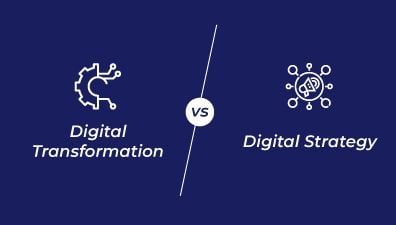In a digital age where information is constantly at our fingertips, transformations in the way we live and work are inevitable. Organizations of all sizes are looking to digital technologies to help them stay competitive and future-proof. But what trends should you be watching out for when it comes to the future of digital transformation? Here’s a closer look at some of the most important ones you should know to prepare for your business.
Table of Contents
Overview of the Future of digital transformation
As industries across the globe continue to digitize, businesses must adapt or risk being left behind. This process, known as digital transformation, can be daunting, but the rewards are clear. Digital transformation is a process of integrating digital technology into all areas of a business, resulting in fundamental changes to how the organization operates and how it delivers value to its customers.

A recent study found that companies that undergo digital transformation enjoy a 19% increase in profitability and a 12% decrease in costs. With numbers like these, it’s no wonder that digital transformation is top of mind for many business leaders.
However, the journey to digital transformation is not without its challenges. In order to succeed, businesses must carefully consider their data strategy, customer experience, and organizational culture. They must also be prepared to embrace change and invest in new technologies. Looking ahead, it’s clear that digital transformation will continue to shape the landscape of business. Those who are able to effectively navigate this shift will be well-positioned for success.
Current trends influencing digital transformation
5G
5G is the next generation of cellular technology, and it is already starting to change how we live and work. 5G networks are faster and more responsive than previous generations, and they have the potential to revolutionize everything from online gaming to autonomous vehicles. In addition, 5G is fueling the development of new virtual and augmented reality technologies.
As 5G becomes a reality, businesses are looking for ways to capitalize on its potential. Many companies are undertaking digital transformation projects to take advantage of the opportunities presented by 5G. From online retailers to manufacturing firms, businesses are rethinking their operations to take advantage of the new capabilities afforded by 5G networks. It is clear that 5G is having a major impact on the business world and that it will continue to do so in the years to come.
Blockchain technology
In recent years, blockchain technology has emerged as a powerful tool for businesses of all types. By creating a secure, decentralized ledger, blockchain provides a tamper-proof record of transactions that can be shared among multiple parties. This makes it an ideal solution for businesses looking to streamline their operations and reduce costs. As a result, many organizations are now turning to blockchain development to help them achieve their digital transformation goals.
Blockchain development offers a number of advantages for businesses seeking to digitize their operations. Include:
- Enables businesses to create a shared database that all authorized parties can access. This can reduce the need for duplicate records and make it easier to track data changes over time.
- Helps businesses to automate their processes and reduce the risk of human error. By using smart contracts, businesses can ensure that all transactions are carried out as intended and that no party can tamper with the data.
- Provides a high level of security, which is essential for protecting sensitive data. With its decentralized nature, blockchain makes it virtually impossible for hackers to breach the network and access sensitive information.
Prioritization of cybersecurity
The way businesses operate has been changing rapidly in recent years, with digital technologies increasingly playing a central role. This shift has brought many benefits but has also created new risks, as companies become more reliant on networked systems that are vulnerable to attacks. Cybersecurity has therefore become a top priority for organizations of all sizes, influencing how they approach digital transformation.

In particular, companies are now emphasizing security more at the start of initiatives, rather than treating it as an afterthought. This shift in priorities is leading to changes in the way businesses select and implement new technologies, as well as how they manage and protect data. As the threat landscape continues to evolve, cybersecurity will remain a critical concern for businesses, and this is likely to have a major impact on the way digital transformation is carried out in the years to come.
Banking digital transformation
As the world progresses, so too does the banking industry. In the past, customers would have to go into a physical bank to conduct any transaction. However, with the advent of digital banking, customers can now do everything from the comfort of their homes. This has led to a massive transformation in the way that banks operate.
No longer are they bound by geographical boundaries; they can now reach out to new markets and expand their customer base. Additionally, digital banking has also made it possible for banks to offer new and innovative services. For example, some banks now offer mobile apps that allow customers to deposit checks remotely. As digital banking continues to evolve, it will undoubtedly have a major impact on how banks operate and do business.
The multi-cloud system
The multi-cloud system is influencing the digital transformation process. The multi-cloud system is a way of using multiple cloud computing services. It allows businesses to use the best features of each service and make them work together. This gives businesses more flexibility and allows them to avoid vendor lock-in.
The multi-cloud system is also helping to drive down costs by allowing businesses to use only the services they need. This leads to more efficient use of resources and a faster transition to the cloud. In addition, the multi-cloud system is making it easier for businesses to integrate new technologies into their existing systems. This is resulting in a more agile and responsive business, which is able to adapt quickly to change. The multi-cloud system is therefore playing a key role in the digital transformation process.
The hybrid work model
The hybrid work model is a digital transformation process that enables employees to work from anywhere, at any time, and on any device. This innovative model has been made possible by advances in technology, allowing businesses to connect with employees no matter where they are located. The flexibility of the hybrid work model has led to increased productivity and creativity, as well as reduced costs for businesses.

In addition, the model has helped to create a more diverse and inclusive workplace, as it provides employees with the opportunity to work from home or another location that is convenient for them. The hybrid work model is therefore having a positive impact on digital transformation processes within businesses.
Artificial intelligence and machine learning
As businesses have become increasingly reliant on technology, there has been a corresponding increase in investments in artificial intelligence (AI) and machine learning (ML). These technologies are playing an increasingly important role in digital transformation, helping organizations automate processes, make better decisions, and improve their overall performance.
There are many different factors driving the adoption of AI and ML, but one of the most important is the increasing availability of data. Organizations now have access to vast quantities of data, thanks to the proliferation of connected devices and sensors. This data can be used to train AI and ML models, which can then be used to improve decision-making, automate processes, and otherwise support digital transformation.
As data becomes more available, we can expect to see even more investments in AI and ML, as organizations seek to harness these powerful technologies to drive their digital transformation efforts.
5 AI-powered tech trends influence the future of digital transformation
The Artificial intelligence of things (AIoT)
The Artificial intelligence of things (AIoT) is the AI-powered tech trend shaping the future of digital transformation. By 2025, AIoT will enable $1.6 trillion in global economic value, according to IDC.
Unlike previous waves of digital transformation, which were driven by personal computers, the Internet, and mobile devices, AIoT will be powered by billions of connected devices that are embedded with AI capabilities. These devices will generate massive amounts of data that can be analyzed to provide insights that were not possible before. This data will be used to improve everything from product design to manufacturing processes to customer service.
In addition, AIoT will enable new business models that are based on providing access to data and insights rather than selling products. As a result, AIoT is poised to have a profound impact on the economy and society in the years to come.
Conversational AI
For businesses large and small, digital transformation is key to keeping up with the competition. And one of the most important aspects of a successful digital transformation strategy is conversational AI.
Conversational AI refers to the use of artificial intelligence to enable computers to communicate with humans in a natural way. This technology is already being used by some of the biggest names in the tech industry, including Amazon, Google, and Facebook.

By harnessing the power of conversational AI, businesses can automate customer service tasks, improve their marketing efforts, and even increase sales. In short, conversational AI is the AI-powered tech trend shaping the future of digital transformation.
No-code AI
The rise of artificial intelligence (AI) is transforming the way businesses operate. In particular, the emergence of no-code AI is changing the landscape of digital transformation.
By allowing businesses to deploy AI-powered solutions without the need for coding skills, no-code AI is making it possible for organizations of all sizes to harness the power of AI. As a result, we are seeing a growing number of businesses using no-code AI to automate key processes and improve decision-making.
In many cases, these solutions are delivering significant improvements in efficiency and productivity. As the benefits of no-code AI become more widely recognized, we expect to see even more businesses embrace this transformative technology in the years ahead.
Machine learning (ML) and hyper-automation
Machine learning (ML) and hyper-automation are two of the most significant trends shaping the future of digital transformation. While ML is providing businesses with the ability to automate tasks and make decisions based on data, hyper-automation is taking this one step further by automating entire processes. By combining these two technologies, businesses are able to achieve unprecedented levels of operational efficiency and effectiveness.
Interestingly, these trends are being driven by advances in artificial intelligence (AI). As AI technology continues to evolve, it is becoming increasingly capable of powering both ML and hyper-automation. This is opening up new possibilities for businesses to transform their operations in meaningful ways.

For example, by harnessing the power of AI, businesses can now automate highly complex tasks that were once impossible to automate. Additionally, AI is also helping businesses to make better use of data by providing them with the ability to identify patterns and trends that would otherwise be invisible.
Looking ahead, it is clear that machine learning and hyper-automation are poised to have a major impact on digital transformation. As these technologies continue to evolve, they will become increasingly important tools for businesses looking to gain a competitive advantage.
AI on the cloud
Artificial intelligence (AI) is rapidly becoming one of the most important technologies shaping the future of digital transformation. By harnessing the computing power of the cloud, AI is able to scale quickly and efficiently, making it a critical tool for businesses looking to stay ahead of the curve.
One of the most significant advantages of AI on the cloud is its ability to enable real-time decision-making. By constantly collecting and analyzing data, AI-powered cloud applications can provide businesses with near-instant insights into their operations. This allows businesses to respond quickly to changes in their environment and make better-informed decisions.
Additionally, AI on the cloud can help businesses automate repetitive tasks and processes, freeing up employees to focus on more creative work. As AI continues to evolve, it will become an increasingly essential tool for businesses looking to streamline their operations and stay ahead of the competition.
To conclude
As we move into the future, it will be important to remember these trends and how they can impact digital transformation. By keeping an open mind and being willing to change with the times, your business can stay ahead of the curve and continue to grow. If you have any questions about digital transformation or want to adapt your business to the modern approach, don’t hesitate to contact our team of eCommerce experts, and we will assist you.











